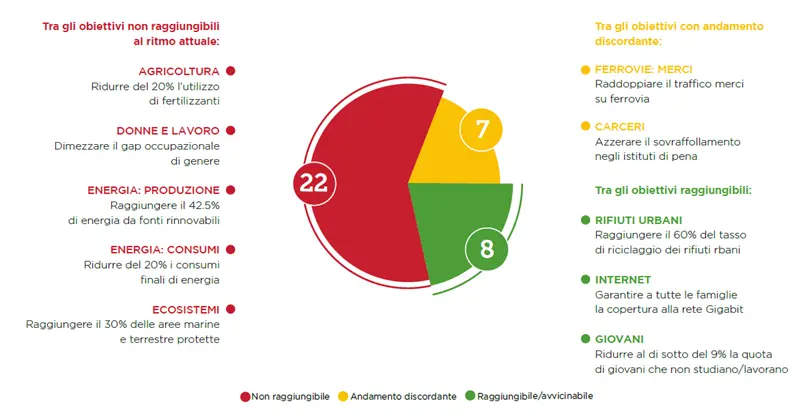October 24, 2024
On October 17, 2024, at the Acquario Romano in Rome, the ninth Report of the Italian Alliance for Sustainable Development (ASviS) was presented, titled "Cultivating our future now". The event highlighted a troubling scenario: Italy is on an unsustainable development path, far from achieving the 17 Sustainable Development Goals (SDGs) of the United Nations 2030 Agenda.
 Figure 1: A moment from the presentation of the 2024 ASviS Report.
Figure 1: A moment from the presentation of the 2024 ASviS Report.
Despite commitments made at the European and international levels, including the Future Pact signed last September, Italy's political decisions remain insufficient. Out of the 37 quantitative goals analyzed, only eight are achievable by 2030. For 22 goals, including the fight against poverty and inequality, the situation is alarming, while seven remain uncertain.
 Figure 2: Overview of the projections based on the Eurostat methodology regarding the analysis of 37 indicators - Source: ASviS.
Figure 2: Overview of the projections based on the Eurostat methodology regarding the analysis of 37 indicators - Source: ASviS.
Enrico Giovannini, ASviS's scientific director, stressed the need for an immediate shift. According to Giovannini, minor adjustments or superficial interventions, often linked to green-washing or social-washing, are not enough. A systemic vision is needed, with sustainability at the core of all public and private policies. "Every delay," he added, "increases the costs of transition and amplifies crises."
The report highlighted how, between 2010 and 2023, there have been deteriorations in five SDG targets, including those related to poverty, inequality, and the quality of terrestrial ecosystems. Meanwhile, only a few sectors, such as health, education, and innovation, have seen consistent improvements. The most encouraging data concerns the circular economy, but this remains an isolated bright spot within a broader landscape of challenges.
Another alarming aspect is the gap between public concerns and government actions. While 93% of Italians believe the country should strengthen its commitment against climate change, only 21% think the government is operating with a long-term vision.
ASviS calls for Italy to urgently implement the National Sustainable Development Strategy, approved in 2023 but largely ignored since. Key proposals include passing a Climate Law to guide the country toward carbon neutrality by 2050. Additionally, ASviS advocates for greater involvement of younger generations in political decision-making, an essential step to ensure an inclusive and sustainable future.
Marcella Mallen, ASviS’s president, emphasized the need for a national acceleration plan directly overseen by the Prime Minister’s office. This plan should address issues such as job insecurity, poverty, and tax redistribution. Critical interventions are also needed in the healthcare system to mitigate the effects of climate change on health and to strengthen services for children and female employment.
The Minister of Enterprises and Made in Italy emphasized the importance of integrating industrial policies with environmental ones, underscoring that Italian businesses must be at the heart of the green transition. The government remains committed to supporting innovation and sustainability as strategic levers for the country's growth.
At the European level, the situation is equally critical: of the 17 goals set by the EU, ten are achievable by 2030. However, the European Union also needs to intensify efforts, particularly in respecting terrestrial ecosystems and partnerships. A positive sign is the renewed commitment of Ursula von der Leyen toward policies aligned with the SDGs, with the European Green Deal remaining a strategic priority.
According to ASviS, Italy faces four potential "game changers" that could significantly shape its future. The Differentiated Autonomy Law poses the risk of widening territorial inequalities and undermining policy coordination needed to achieve the SDGs. However, there are three positive factors. European Sustainability Directives offer Italian companies an opportunity to improve competitiveness through greater social and environmental transparency. The European Regulation on Nature Restoration introduces binding targets for ecosystem recovery, creating opportunities for environmental development and employment. Finally, the 2022 constitutional amendment enshrines the principle of intergenerational justice, ensuring that economic activities do not harm health and the environment.
Italy now has a unique opportunity to change course, but it requires a concrete, coordinated, and long-term commitment. The country's sustainable future depends on the choices made today.
The ninth ASviS report sends a clear message: time is running out, and Italy must accelerate its efforts to embrace a sustainable development model. The necessary reforms are not just technical but require a far-reaching political vision and the involvement of all sectors of society. Cultivating our future now means taking action immediately, for the benefit of present and future generations.
As ASviS presidents Marcella Mallen and Pierluigi Stefanini state, "This is not the time for disengagement but for hope and action. It is time to cultivate our future".

Marialuce Ribellino